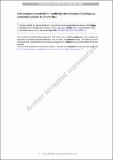Soft computing methods for multiobjective location of garbage accumulation points in smart cities
Author(s)
Toutouh, Jamal; Rossit, Diego; Nesmachnow, Sergio
Download10472_2019_9647_ReferencePDF.pdf (8.474Mb)
Publisher Policy
Publisher Policy
Article is made available in accordance with the publisher's policy and may be subject to US copyright law. Please refer to the publisher's site for terms of use.
Terms of use
Metadata
Show full item recordAbstract
Abstract
This article describes the application of soft computing methods for solving the problem of locating garbage accumulation points in urban scenarios. This is a relevant problem in modern smart cities, in order to reduce negative environmental and social impacts in the waste management process, and also to optimize the available budget from the city administration to install waste bins. A specific problem model is presented, which accounts for reducing the investment costs, enhance the number of citizens served by the installed bins, and the accessibility to the system. A family of single- and multi-objective heuristics based on the PageRank method and two mutiobjective evolutionary algorithms are proposed. Experimental evaluation performed on real scenarios on the cities of Montevideo (Uruguay) and Bahía Blanca (Argentina) demonstrates the effectiveness of the proposed approaches. The methods allow computing plannings with different trade-off between the problem objectives. The computed results improve over the current planning in Montevideo and provide a reasonable budget cost and quality of service for Bahía Blanca.
Date issued
2019-06-20Department
Massachusetts Institute of Technology. Computer Science and Artificial Intelligence LaboratoryPublisher
Springer International Publishing